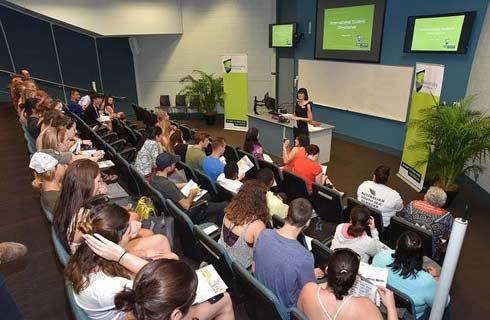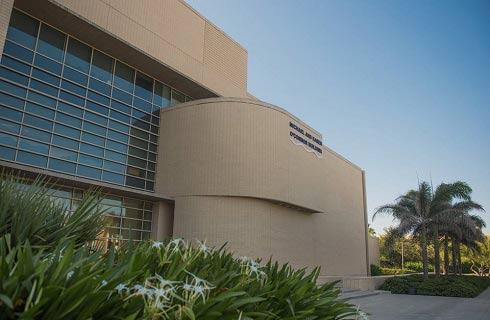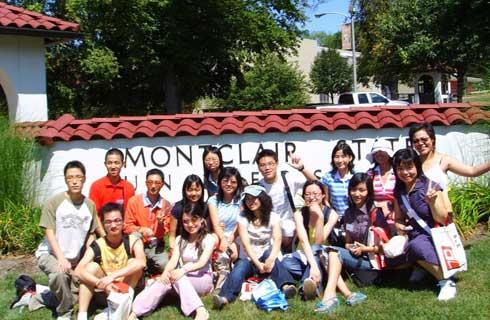- IDP China>
- 课程库>
- 艺术与设计>
- 艺术、人文与社会科学>
- 语言文学>
- Master of Interpreting and Translation Studies (Double Masters International) - A6024
Master of Interpreting and Translation Studies (Double Masters International) - A6024

学历文凭
Masters Degree (Coursework)

专业院系
Arts, Humanities and Social Sciences

开学时间

课程时长

课程学费

国际学生入学条件
An Australian bachelor degree with a major in French (or equivalent) with at least credit (60%) average. The level of language competence should be equivalent to at least three years university study
or
An Australian bachelor degree (or equivalent) and an Australian graduate certificate (or equivalent) equivalent to a major in French with at least credit (60%) average in both qualifications.
Kobe City University of Foreign Studies
An Australian bachelor degree (or equivalent) with a major in Japanese, linguistics or literature or equivalent, with at least credit (60%) average, including Japanese language proficiency equivalent to the Common European Framework Reference (CEFT) C1 level (Proficient User – effective operational proficiency).
or
An Australian bachelor degree (or equivalent) and an Australian graduate certificate (or equivalent) equivalent to a major in Japanese, linguistics or literature or equivalent, with at least credit (60%) average, including Japanese language proficiency equivalent to the Common European Framework Reference (CEFT) C1 level (Proficient User – effective operational proficiency).
University of Bologna
An Australian bachelor degree (or equivalent) with a major in Italian, French, German, Spanish, Japanese, Chinese (Mandarin), Korean, Indonesian or Russian (or equivalent) with at least credit (60%) average. The level of language competence should be the equivalent of at least three years university study.
or
An Australian bachelor degree (or equivalent) and an Australian graduate certificate (or equivalent) equivalent to a major in Italian, French, German, Spanish, Japanese, Chinese (Mandarin), Korean, Indonesian or Russian with at least credit (60%) average in both qualifications. IELTS (Academic): 6.5 Overall score, with minimum band scores: Listening 6.0, Reading 6.0, Writing 6.0 and Speaking 6.0 TOEFL Internet-based test: 79 Overall score, with minimum scores: Reading 13, Listening 12, Speaking 18 and Writing 21
Paper-based TOEFL – 550 Minimum band score Test of written English: 4.5
IDP—雅思考试联合主办方

雅思考试总分
6.5
- 雅思总分:6.5
- 托福网考总分:79
- 托福笔试总分:550
- 其他语言考试:Pearson Test of English (Academic): 58 Overall score, with minimum scores: Listening 50, Reading 50, Speaking 50 and Writing 50
CRICOS代码: 103504H
申请截止日期: 请与IDP联系 以获取详细信息。
课程简介
相关申请
 预科
预科 奖学金
奖学金 实习机会
实习机会 在校学习
在校学习 跨境学习
跨境学习 校园授课-线上开始
校园授课-线上开始 在线/远程学习
在线/远程学习
开学时间&学费
学费信息仅供参考,请与IDP联系以获取详细信息
| 开学时间 | 时长 | 学费 | 地点 |
|---|
学校排名

世界排名84
数据源:
泰晤士高等教育世界大学排名
关于蒙纳士大学

蒙纳士大学(Monash University),世界百强名校,是澳洲八大名校(Group of Eight)的盟校成员。于1958年由国会建立,是维多利亚州的第二所古老的大学,为纪念杰出的澳大利亚军人、学者兼工程师约翰·蒙纳士爵士,大学以其姓氏命名。蒙纳士大学以其卓越的教学和精湛的科研而在国际拥有声誉,蒙纳士是澳大利亚规模最大的国立大学之一,其综合实力在各大学中名列前茅,也是著名的密集研究型大学,被评为澳大利亚五星级大学。并在四大洲多个国家设有校区和科研中心,与全球科研领域与高校紧密合作,在北美,欧洲,英国,亚洲以及非洲建立了合作关系并结为联盟。蒙纳士在墨尔本有七个校区,每个校区皆各具特色。蒙纳士大学拥有包括澳大利亚肝细胞中心等100个研究中心和17个合作研究所,是澳洲主要的国内研究机构。
本校相关课程

健康科学学士(荣誉学位)
学历文凭
Bachelor Degree with Honours
开学日期
课程费用总额


建筑学硕士
学历文凭
Masters Degree (Coursework)
开学日期
课程费用总额


美术学士(荣誉学位)
学历文凭
Bachelor Degree with Honours
开学日期
课程费用总额


商科研究生证书
学历文凭
Graduate Certificate
开学日期
课程费用总额


专业会计硕士和商法硕士
学历文凭
Masters Degree (Coursework)
开学日期
课程费用总额


外科硕士
学历文凭
Masters Degree (Research)
开学日期
课程费用总额

其他相关课程

法语和数学(荣誉)文学士学位
 斯特灵大学
斯特灵大学泰晤士高等教育世界大学排名:594
学历文凭
Bachelor Degree with Honours
开学日期
课程费用总额


文学硕士(荣誉学位)意大利语和波斯语
 圣安德鲁斯大学
圣安德鲁斯大学泰晤士高等教育世界大学排名:162
学历文凭
Bachelor Degree
开学日期
课程费用总额


硕士(荣誉)德语/意大利语
 格拉斯哥大学
格拉斯哥大学泰晤士高等教育世界大学排名:84
学历文凭
Bachelor Degree
开学日期
课程费用总额


文学硕士-法语
 奥克兰大学
奥克兰大学学历文凭
Masters Degree (Research)
开学日期
课程费用总额


法语学士(荣誉)学士学位
 华威大学
华威大学泰晤士高等教育世界大学排名:123
学历文凭
Bachelor Degree
开学日期
课程费用总额


商务英语强化课程(伦敦校区)
 Stafford House International
Stafford House International学历文凭
English Language
开学日期
课程费用总额










 澳大利亚
澳大利亚